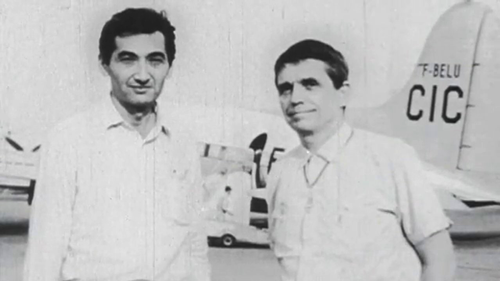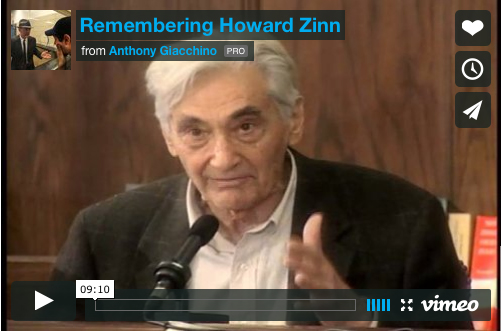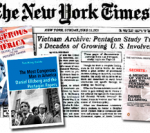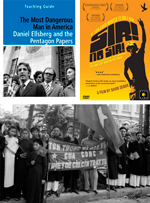This year, as the Pentagon prepares to commemorate the 50th anniversary of the Vietnam War, we revisit this essay by Howard Zinn written in 1998, the 30th anniversary year of when he traveled with the Reverend Daniel Berrigan to Hanoi to receive prisoners released by the North Vietnamese. In talking about the terrible effects of the Vietnam War, Zinn states, “all wars are wars against civilians, and are therefore inherently immoral” and “political leaders all over the world should not be trusted when they urge their people to war claiming superior knowledge and expertise.” This is an excerpt from Howard Zinn on War followed by related resources.

____________________________________________________
Thirty years later, this might be a good time to reflect on what we might learn from that longest of our wars, the one which has brought agreement from both opponents of the war and political leaders who promulgated the war (Robert McNamara being the most vivid recent example) that it was a shameful episode in our nation’s history.
I do not pretend to be a cool and distant commentator, although I have read widely and listened carefully to all the major arguments. To me, the war was a disaster not, as some have said (McNamara among them), because it could not be won. The display of a huge army to a small country, the merciless bombing of both enemy and “friendly” territory, the deaths of perhaps three million people and destruction of a beautiful land, the brutal massacres at My Lai and other places, were morally indefensible, win or lose.
None of the “reasons” given to explain what we did—stopping the spread of Communism, defending an ally, fulfilling our “treaty obligations”—could stand up under examination. And even if any element of that explanation might be true—perhaps we could have a non-Communist corrupt government in South Vietnam instead of a Communist dictatorship there—would it justify the mass slaughter of Asian peasants and the death of 58,000 Americans, to say nothing of all those left blind, maimed, paralyzed on both sides?
Most Americans came to understand this. Their basic sense of decency came to the fore when they learned what was going on…. The surveys of public opinion showed a steady growth of opposition to the war, in all sectors of the nation. In August of 1965, 61 percent of the population approved of the American involvement in Vietnam. By May of 1971 it was exactly reversed, now 61 percent thought our involvement was wrong.
Perhaps the most dramatic evidence of the change was the veterans coming back from Vietnam organized to oppose the war. (Ron Kovic, for one, paralyzed, writing Born on the Fourth of July).
What have we learned that might be of use in our world today? I suggest the following as starters:
That with the indiscriminate nature of modern military technology (no such thing as a “smart bomb,” it turns out) all wars are wars against civilians, and are therefore inherently immoral. This is true even when a war is considered “just,” because it is fought against a tyrant, against an aggressor, to correct a stolen boundary. (The “good war” against Saddam Hussein has succeeded only in bringing about the deaths of hundreds of thousands of Iraqi children, according to United Nations reports.)
The political leaders all over the world should not be trusted when they urge their people to war claiming superior knowledge and expertise. The North Vietnamese leaders sacrificed their people for “socialism,” whose principles they then betrayed. The recently released tapes of Kennedy, Johnson, and Nixon, all show a terrifying common thread: that they were willing to watch soldiers and civilians die in large numbers while they calculated the effect on their re-election of stopping those deaths by withdrawing from Vietnam.
Howard Zinn on War
Essays by Howard Zinn from 1962 to 2006 that examine specific wars, wartime incidents, and the force of non-violence to move beyond war, if we are to survive. Introduction by Marilyn B. Young. Read more at Seven Stories Press.
Vietnam: The Logic of Withdrawal
In this slim book written in 1967, Howard Zinn offers a compelling case against the Vietnam War. He includes a powerful speech that President Johnson should have given to lay out the case for ending the war. Read more at Haymarket Books.
A Break-in for Peace
Howard Zinn recollects a break-in of a federal building carried out by the Camden 28, where the motive was to protest the war in Vietnam in this 2002 Progressive article. Continue reading.
Camden 28 Retrospective: Zinn Recounts His Testimony
In this film clip, Zinn recounts his role an expert on civil disobedience in the trial of the Camden 28 and other Vietnam war protesters and what his job was as an expert witness. Watch online.Camouflaging the Vietnam War: How Textbooks Continue to Keep the Pentagon Papers a Secret
While new U.S. history textbooks mention the Pentagon Papers, they do not grapple with the actual import of the Pentagon Papers. Read more at the Zinn Education Project.
Teaching Resources on the Vietnam War and Anti-War Movements
Visit the Zinn Education Project for resources on Teaching the Vietnam War: Beyond the Headlines.
Category: Tags: Excerpts, Vietnam War









